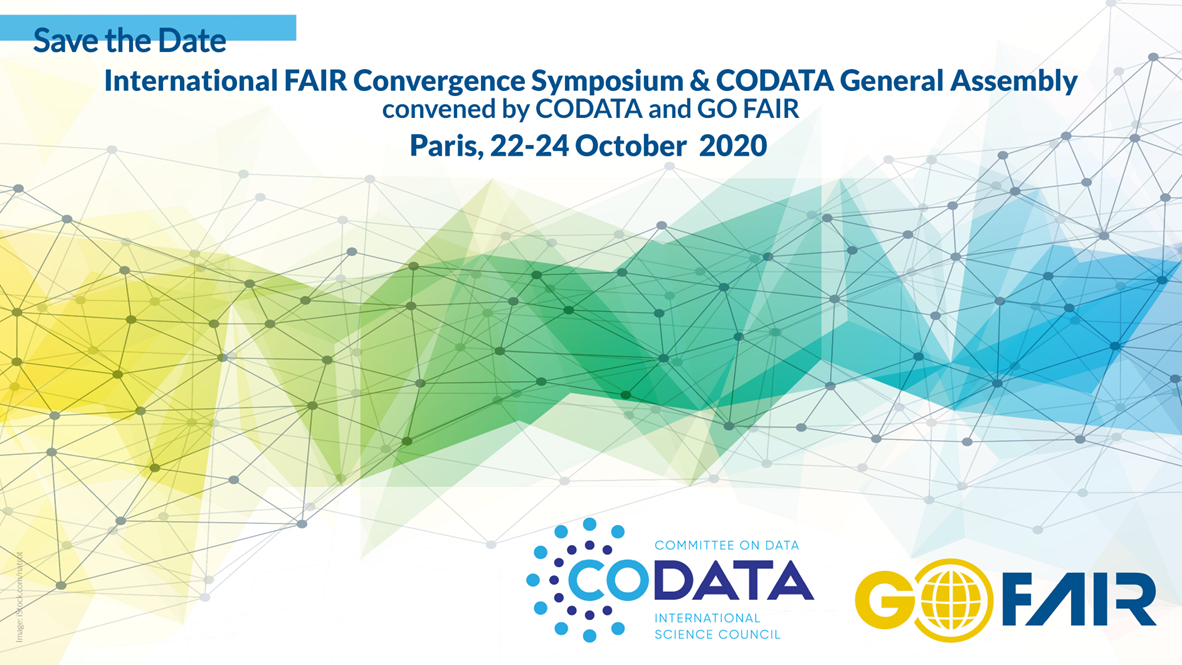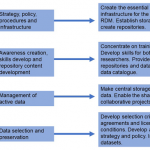 A special issue on The FAIR Principles: First Generation Implementation Choices and Challenges, has been recently published in Data Intelligence. This special issue, organized by Prof. Dr. Barend Mons, the senior author of the foundational paper on FAIR Principles and the President of CODATA, Dr. Erik Schultes and Dr. Annika Jacobsen, contains 28 articles authored by 135 experts from 14 countries/territories worldwide.
A special issue on The FAIR Principles: First Generation Implementation Choices and Challenges, has been recently published in Data Intelligence. This special issue, organized by Prof. Dr. Barend Mons, the senior author of the foundational paper on FAIR Principles and the President of CODATA, Dr. Erik Schultes and Dr. Annika Jacobsen, contains 28 articles authored by 135 experts from 14 countries/territories worldwide.
In this special issue, the original conception of the FAIR principles and what they are intended to cover is explained in detail (see https://www.mitpressjournals.org/doi/abs/10.1162/dint_r_00024), and the prototype of FAIR Implementation Profile and the FAIR convergence Matrix which aims to coordinate a broadly accepted, widely used FAIR implementation approaches is presented (see https://www.mitpressjournals.org/doi/abs/10.1162/dint_a_00038). The first 16 articles are bundled as a relevant set of “first generation” implementations and emerging practices in the context of FAIR and the last 12 articles focus more on gaps in existing technology and practices encountered or envisioned and offer opinions and propose directional solutions for the relevant communities to develop FAIR guided approaches. Although this special issue only has covered a limited number of all early endeavors, “it will likely inspire other efforts to bundle and expose useful and hopefully reusable solutions”, as stated by Prof. Dr. Rianne Letschert in her brief introductory comment to this special issue.
The TOC of the issue is listed below. To go to a full-text page, please just click on the title.
____________________________________________________________________
Editorial: The FAIR Principles: First Generation Implementation Choices and Challenges
Barend Mons, Erik Schultes, Fenghong Liu & Annika Jacobsen
1 FAIR Principles: Interpretations and Implementation Considerations
- Jacobsen, R. de Miranda Azevedo, N. Juty, D. Batista, S. Coles, R. Cornet, … & E. Schultes.
2 Unique, Persistent, Resolvable: Identifiers as the Foundation of FAIR
Nick Juty, Sarala M. Wimalaratne, Stian Soiland-Reyes, John Kunze, Carole A. Goble & Tim Clark
3 Making Data and Workflows Findable for Machines
Tobias Weigel, Ulrich Schwardmann, Jens Klump, Sofiane Bendoukha & Robert Quick
4 The “A” of FAIR – As Open as Possible, as Closed as Necessary
Annalisa Landi, Mark Thompson, Viviana Giannuzzi, Fedele Bonifazi, Ignasi Labastida, Luiz Olavo Bonino da Silva Santos & Marco Roos
5 A Generic Workflow for the Data FAIRification Process
Annika Jacobsen, Rajaram Kaliyaperumal, Luiz Olavo Bonino da Silva Santos, Barend Mons, Erik Schultes, Marco Roos & Mark Thompson
6 Ontology-based Access Control for FAIR Data
Christopher Brewster, Barry Nouwt, Stephan Raaijmakers & Jack Verhoosel
7 FAIR Data Reuse – the Path through Data Citation
Paul Groth, Helena Cousijn, Tim Clark & Carole Goble
8 Making FAIR Easy with FAIR Tools: From Creolization to Convergence
Mark Thompson, Kees Burger, Rajaram Kaliyaperumal, Marco Roos & Luiz Olavo Bonino da Silva Santos
9 Distributed Analytics on Sensitive Medical Data: The Personal Health Train
Oya Beyan, Ananya Choudhury, Johan van Soest, Oliver Kohlbacher5, Lukas Zimmermann, Holger Stenzhorn, Md. Rezaul Karim, Michel Dumontier, Stefan Decker, Luiz Olavo Bonino da Silva Santos & Andre Dekker
10 FAIR Computational Workflows
Carole Goble, Sarah Cohen-Boulakia, Stian Soiland-Reyes, Daniel Garijo,Yolanda Gil, Michael R. Crusoe, Kristian Peters & Daniel Schober
11 FAIR Data and Services in Biodiversity Science and Geoscience
Larry Lannom, Dimitris Koureas & Alex R. Hardisty
12 Taking FAIR on the ChIN: The Chemistry Implementation Network
Simon J. Coles, Jeremy G. Frey, Egon L. Willighagen & Stuart J. Chalk
13 Growing the FAIR Community at the Intersection of the Geosciences and Pure and Applied Chemistry
Shelley Stall, Leah McEwen, Lesley Wyborn, Nancy Hoebelheinrich & Ian Bruno
14 Helping the Consumers and Producers of Standards, Repositories and Policies to Enable FAIR Data
Peter McQuilton, Dominique Batista, Oya Beyan, Ramon Granell, Simon Coles, Massimiliano Izzo … & Susanna-Assunta Sansone
15 FAIR Convergence Matrix: Optimizing the Reuse of Existing FAIR-Related Resources
Hana Perg Sustkova, Kristina Maria Hettne, Peter Wittenburg, Annika Jacobsen, Tobias Kuhn … & Erik Schultes
16 The FAIR Funding Model: Providing a Framework for Research Funders to Drive the Transition toward FAIR Data Management and Stewardship Practices
Margreet Bloemers & Annalisa Montesanti
17 Ontology, Ontologies and the “I” of FAIR
Giancarlo Guizzardi
18 How to (Easily) Extend the FAIRness of Existing Repositories
Mark Hahnel & Dan Valen
19 Licensing FAIR Data for Reuse
Ignasi Labastida1 & Thomas Margoni
20 Data Management Planning: How Requirements and Solutions are Beginning to Converge
Sarah Jones, Robert Pergl, Rob Hooft, Tomasz Miksa, Robert Samors, Judit Ungvari … & Tina Lee
21 Social Data: CESSDA Best Practices
Ron Dekker
22 State of FAIRness in ESFRI Projects
Peter Wittenburg, Franciska de Jong, Dieter van Uytvanck, Massimo Cocco, Keith Jeffery, Michael Lautenschlager … & Petr Holub
23 GO FAIR Brazil: A Challenge for Brazilian Data Science
Luana Sales, Patrícia Henning, Viviane Veiga, Maira Murrieta Costa, Luís Fernando Sayão, Luiz Olavo Bonino da Silva Santos & Luís Ferreira Pires
24 FAIR Practices in Africa
Mirjam van Reisen, Mia Stokmans, Munyaradzi Mawere, Mariam Basajja, Antony Otieno Ong’ayo, Primrose Nakazibwe, Christine Kirkpatrick & Kudakwashe Chindoza
25 FAIR Practices in Europe
Peter Wittenburg, Michael Lautenschlager, Hannes Thiemann, Carsten Baldauf & Paul Trilsbeek
26 Towards the Tipping Point for FAIR Implementation
Mirjam Van Reisen, Mia Stokmans, Mariam Basajja, Antony Otieno Ong’ayo, Christine Kirkpatrick & Barend Mons
27 The Need of Industry to Go FAIR
Herman van Vlijmen, Albert Mons, Arne Waalkens, Wouter Franke, Arie Baak, Gerbrand Ruiter … & Jean-Marc Neefs.
28 Considerations for the Conduction and Interpretation of FAIRness Evaluations
Ricardo de Miranda Azevedo, Mark Wilkinson & Michel Dumontier
_____________________________________________________________________
About Data Intelligence
Data Intelligence (DI) journal, a new publication jointly launched by the MIT Press and Chinese Academy of Sciences. It is chaired by Prof. Barend Mons. Co-Editors in Chief of the journal are Prof. Jim Hendler at Rensselaer Polytechnic Institute, USA , Prof Huizhou Liu, the Chinese Academy of Sciences and Prof. Ying Ding at University of Texas at Austin.
 CODATA and IIASA have co-convened a Workshop on Big (and FAIR) Data and Systems Analysis, 24-25 February. The workshop is organised by the CODATA Task Group on Advanced Mathematical Tools for Data-Driven Applied Systems Analysis which is working closely with IIASA (the International Institute for Applied Systems Analysis) on the interface of data, mathematical tools and systems analysis.
CODATA and IIASA have co-convened a Workshop on Big (and FAIR) Data and Systems Analysis, 24-25 February. The workshop is organised by the CODATA Task Group on Advanced Mathematical Tools for Data-Driven Applied Systems Analysis which is working closely with IIASA (the International Institute for Applied Systems Analysis) on the interface of data, mathematical tools and systems analysis.
 euroCRIS, the International Organisation for Research Information will hold its biennial International Conference (CRIS2020) from June 17-20 in Limassol, Cyprus: New Technologies and Open Science in CRIS Systems.
euroCRIS, the International Organisation for Research Information will hold its biennial International Conference (CRIS2020) from June 17-20 in Limassol, Cyprus: New Technologies and Open Science in CRIS Systems. All the necessary information on the CfP for CRIS2020 can be found at:
All the necessary information on the CfP for CRIS2020 can be found at: 













